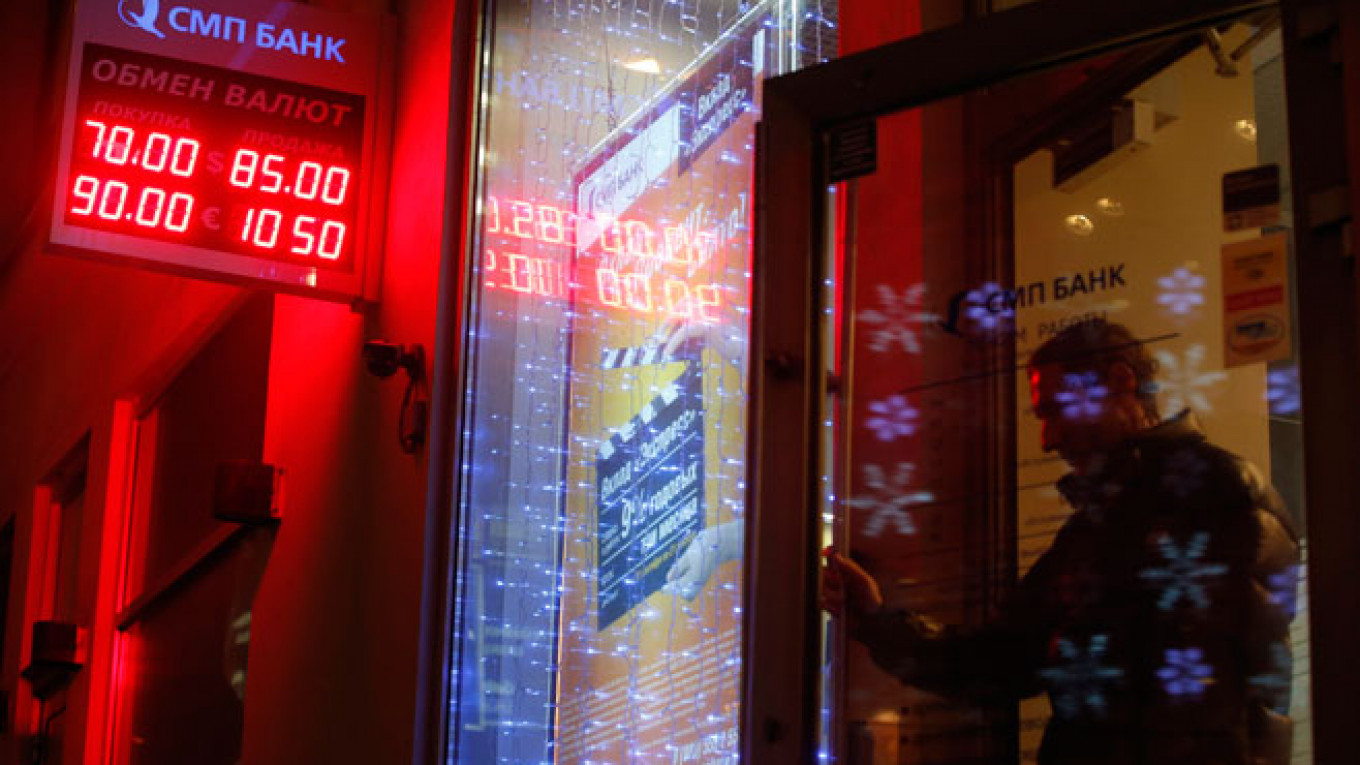As the ruble free-falls like a skydiver with a faulty pack two days ahead of President Vladimir Putin's annual press conference, it is clear that someone will have to pay.
Putin has so far ignored what will inevitably go down as "Black Tuesday," making no public statements about the ruble's plummet. But despite his silence, as well as his famous reluctance to crack down on loyal subordinates, everyone knows that someone will be made accountable for the mounting economic crisis.
Experts polled by The Moscow Times said the reaction is likely to be limited to scapegoating, however, and not a strategic policy change needed to salvage the economy.
The Moscow Times offers a list of the Kremlin's most likely staff responses to the crisis — with explanations of why they are not likely to work.
5. Do Nothing
A tempting option: During the previous crisis in 2008-09, no top government official faced the boot.
Why not: The situation is just too bad to let it slide.
4. Blame America
Not strictly a staff reaction, but one that has already been implemented: The state media have been lambasting the United States and the European Union for months.
Why not: The Kremlin milked West-o-phobia for too long to explain the new round of turmoil. "The United States is not enough anymore," said Sergei Shelin, an analyst who contributes political and economic commentary to Russian media outlets including Gazeta.ru, Rosbalt and Novaya Gazeta.
3. Blame the Opposition
This was done by Igor Sechin, the head of state-owned Rosneft — the very same person who is accused by opposition activists like Alexei Navalny of causing "Black Tuesday" by borrowing 625 billion rubles from the state and selling the money as bonds.
Why not: Putin always insisted that the opposition is too weak to be of any impact — much less ruining a whole economy. And really, Navalny cannot take all the credit.
2. Fire the Head of the Central Bank
Almost everybody — from lawmakers and business lobbyists to presidential adviser Sergei Glazyev — hates Elvira Nabiullina due to a series of debatable policy decisions.
"Putin and the government are using Nabiullina as a human shield," Shelin quipped.
Why not: The Central Bank can only influence one sector of the economy, said independent political analyst Dmitry Oreshkin. This means that its heads can be rotated like pistons in a cylinder, but to no avail until other causes of the crisis — e.g. domestic economic mismanagement — are addressed.
1. Fire the Prime Minister
Even before the crisis, analysts agreed that Medvedev was being kept in the job precisely to be the sacrificial lamb if things went wrong. No better time than now, when rumors abound that his enemy, ex-Finance Minister Alexei Kudrin, has already been offered Medvedev's job, a claim Kudrin's spokesperson denied on Govorit Moskva radio.
Why not: Why, yes, in fact: Experts say Medvedev is too weak and has to go. "Kudrin may not end the crisis, but he'd handle it better than Medvedev — because it's impossible to do worse," Shelin said.
But Kudrin will have to struggle against Яber-statists in the government, state corporations and security services. And Putin just may give in to them altogether and appoint Glazyev (who advocated planned economy measures such as a fixed ruble rate) as the new prime minister — which, Oreshkin said, "would be a death sentence for the economy."
Contact the author at [email protected]
A Message from The Moscow Times:
Dear readers,
We are facing unprecedented challenges. Russia's Prosecutor General's Office has designated The Moscow Times as an "undesirable" organization, criminalizing our work and putting our staff at risk of prosecution. This follows our earlier unjust labeling as a "foreign agent."
These actions are direct attempts to silence independent journalism in Russia. The authorities claim our work "discredits the decisions of the Russian leadership." We see things differently: we strive to provide accurate, unbiased reporting on Russia.
We, the journalists of The Moscow Times, refuse to be silenced. But to continue our work, we need your help.
Your support, no matter how small, makes a world of difference. If you can, please support us monthly starting from just $2. It's quick to set up, and every contribution makes a significant impact.
By supporting The Moscow Times, you're defending open, independent journalism in the face of repression. Thank you for standing with us.
Remind me later.







